Relationships & Health
Our aims
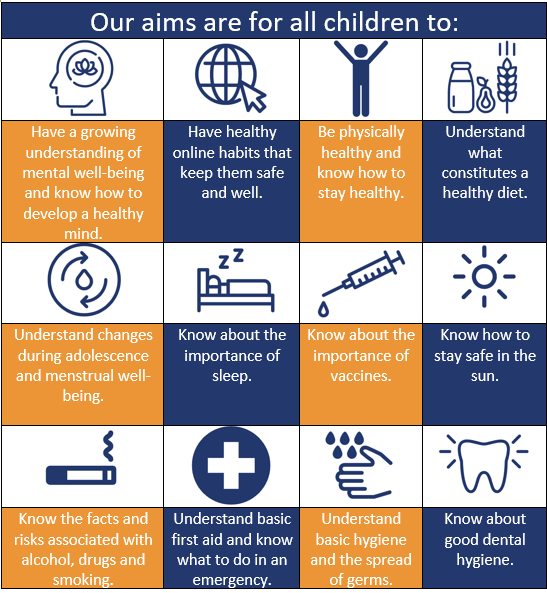
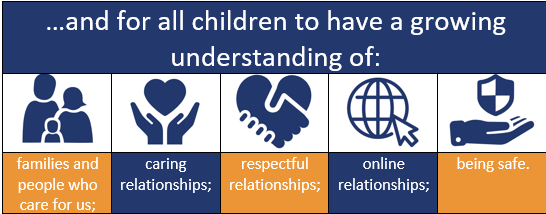
Our curriculum overview
Relationships and Health Education (RHE) is an important part of our school commitment to provide pupils with the knowledge and skills to keep themselves safe, make healthy choices, develop respect for themselves and others, and form positive and healthy relationships.
You can learn more about RHE provision in school by reading our RHE policy (click here).
The government guidance for Relationships and Health Education (2019) outlines statutory learning outcomes for all primary-aged pupils from September 2020. In addition, as recommended by the Department for Education, we also teach non-statutory elements of sex education in an age appropriate manner in year 6. Families are invited to view the content of these lessons as part of our annual consultation. This takes place every June - look out for the date on the school calendar. If you miss this and would like to see the content, please use the contact us tab on the website and we'll get in touch.
To deliver our curriculum, we use the Discovery Education Health and Relationships Programme to support us in meeting these outcomes through dedicated lesson time, in addition to cross-curricular learning through e.g. science (dental hygiene, healthy diet etc.) and through whole school and key stage assemblies e.g. Internet Legends online safety.
The programme lessons progress from year 1 to year 6 with activities and videos to make learning engaging and enjoyable for our pupils, as well as developing their learning and understanding in an age-appropriate way.
The curriculum is divided into six topics, as detailed below.
(c) Courtesy of Discovery Education

This topic explores friendships: their importance, what being a good friend means, and how to keep friendships positive and healthy. Pupils investigate their own values and identity (including their online identity), and develop skills to resolve difficulties within friendships, including maintaining and respecting personal boundaries and safe touch, managing peer pressure and coping with the effects of change within friendships.

This topic focuses on and celebrates the similarities and differences between people, exploring and encouraging ways to value and respect difference and diversity . It looks at the damaging effect that stereotypes can have, and how to identify and challenge them. It helps pupils recognise their own personal strengths and abilities and develop self-respect.

This topic focuses on special people. It explores why they are special and how they care for one another and keep one another safe. It examines pupils’ increasing responsibilities towards themselves and others as they get older, including the role they can play and the difference they can make within their communities.

This topic explores the importance and diversity of families, and the characteristics of healthy, positive family relationships. It enables pupils to recognise when they may feel unsafe within a family, and how to ask for help if they need it. It identifies the characteristics of a committed relationship, and at Year 6 explores human reproduction and other ways that people can start a family.

This topic explores how to stay healthy, both physically and mentally. It looks at ways to maintain wellbeing and prevent illness; how to develop a healthy, balanced lifestyle; and the consequences and effects of different habits and choices. It encourages the development of positive self-worth and recognition, and explores what might cause or influence unhealthy ways of thinking and how to overcome them.

This topic explores how people grow and change from babies, through puberty to adulthood. At Key Stage 1, it examines ways in which children have grown and how they will continue to change, and how to develop resilience. At Key Stage 2, it identifies changes that will take place in children’s bodies during puberty, and explores ways to manage the emotional effects of life changes, including the transition to secondary school.
Teachers will answer any questions from pupils in an age-appropriate and factual way, without personal bias or judgement. Questions will be answered in one of the following ways:
- by providing an answer to the whole class;
- by giving an individual answer to a pupil;
- on rare occasions, by contacting parents if we feel the question would be better handled in the home setting.
Any questions that give rise to concerns of a safeguarding nature will be handled in line with our safeguarding policy.
What's taught in Year 1?
In year 1, pupils cover the following content across the year:
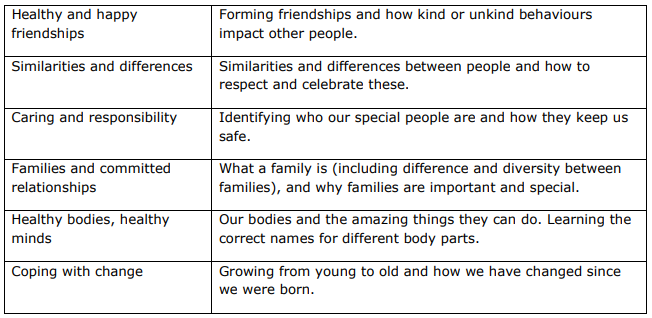
What's taught in Y2?
In year 2, pupils cover the following content across the year:
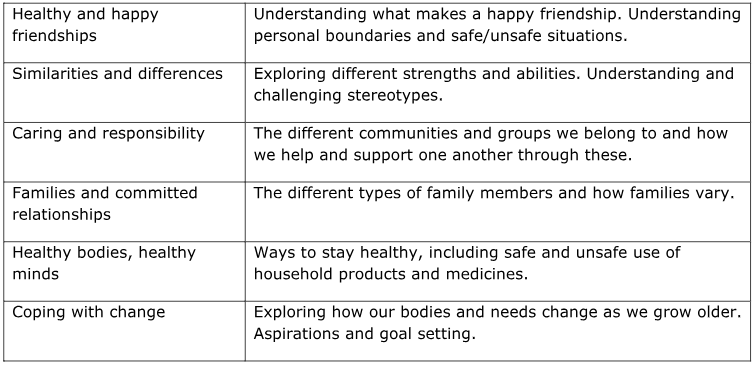
What's taught in Y3?
In year 3, pupils cover the following content across the year:
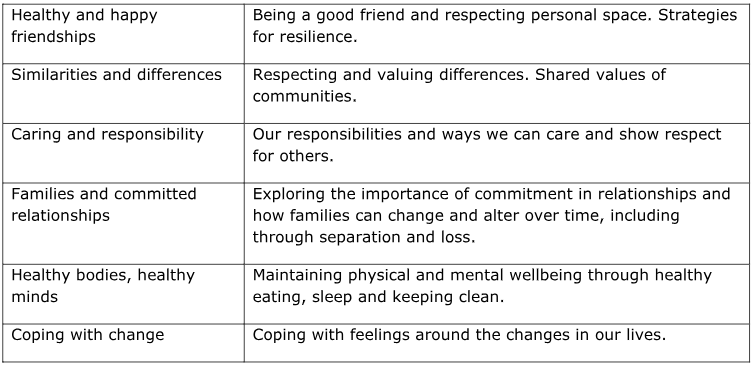
What's taught in Y4?
In year 4, pupils cover the following content across the year:
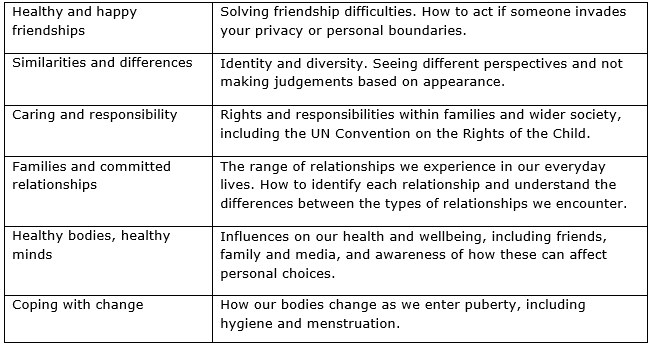
What's taught in Y5?
In year 5, pupils cover the following content across the year:
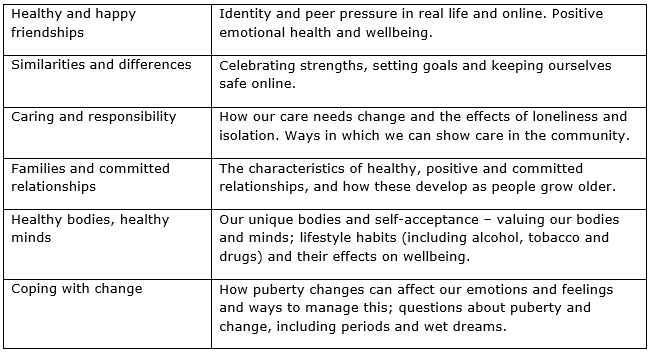
What's taught in Y6?
In year 6, pupils cover the following content across the year:
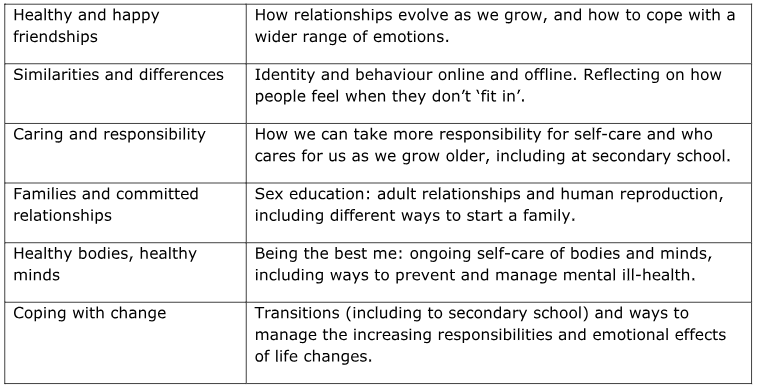
How do we enrich the curriculum?
Throughout the year, we aim to use other sources of expertise to enhance children's knowledge and understanding. This includes:
- NSPCC Speak out, stay safe assemblies and workshops across KS1&2
- Consent workshops in year 6
- TfL safer travel workshops in year 5&6
- Internet Legends online safety programme in KS2
- Safer Streets workshops in year 5&6
Our Relationships, Sex & Health Education Policy
This policy can also be downloaded / viewed at the foot of the page.
Defining Relationships Education (taken from the DfE guidance)
The focus in primary school should be on teaching the fundamental building blocks and characteristics of positive relationships, with particular reference to friendships, family relationships, and relationships with other children and with adults. This starts with pupils being taught about what a relationship is, what friendship is, what family means and who the people are who can support them. From the beginning of primary school, building on early education, pupils should be taught how to take turns, how to treat each other with kindness, consideration and respect, the importance of honesty and truthfulness, permission seeking and giving, and the concept of personal privacy.
Establishing personal space and boundaries, showing respect and understanding the differences between appropriate and inappropriate or unsafe physical, and other, contact – these are the forerunners of teaching about consent, which takes place at secondary. Respect for others should be taught in an age-appropriate way, in terms of understanding one’s own and others’ boundaries in play, in negotiations about space, toys, books, resources and so on. From the beginning, teachers should talk explicitly about the features of healthy friendships, family relationships and other relationships which young children are likely to encounter. Drawing attention to these in a range of contexts should enable pupils to form a strong early understanding of the features of relationships that are likely to lead to happiness and security. This will also help them to recognise any less positive relationships when they encounter them.
The principles of positive relationships also apply online especially as, by the end of primary school, many children will already be using the internet. When teaching relationships content, teachers should address online safety and appropriate behaviour in a way that is relevant to pupils’ lives. Teachers should include content on how information and data is shared and used in all contexts, including online; for example, sharing pictures, understanding that many websites are businesses and how sites may use information provided by users in ways they might not expect.
Teaching about families requires sensitive and well-judged teaching based on knowledge of pupils and their circumstances. Families of many forms provide a nurturing environment for children. (Families can include for example, single parent families, LGBT parents, families headed by grandparents, adoptive parents, foster parents and carers amongst other structures.) Care needs to be taken to ensure that there is no stigmatisation of children based on their home circumstances and needs, to reflect sensitively that some children may have a different structure of support around them; for example, looked after children or young carers.
A growing ability to form strong and positive relationships with others depends on the deliberate cultivation of character traits and positive personal attributes, (sometimes referred to as ‘virtues’) in the individual. In a school wide context which encourages the development and practice of resilience and other attributes, this includes character traits such as helping pupils to believe they can achieve, persevere with tasks, work towards long-term rewards and continue despite setbacks. Alongside understanding the importance of self-respect and self-worth, pupils should develop personal attributes including honesty, integrity, courage, humility, kindness, generosity, trustworthiness and a sense of justice. This can be achieved in a variety of ways including by providing planned opportunities for young people to undertake social action, active citizenship and voluntary service to others locally or more widely.
Relationships Education also creates an opportunity to enable pupils to be taught about positive emotional and mental wellbeing, including how friendships can support mental wellbeing. Through Relationships Education, schools should teach pupils the knowledge they need to recognise and to report abuse, including emotional, physical and sexual abuse. In primary schools, this can be delivered by focusing on boundaries and privacy, ensuring young people understand that they have rights over their own bodies. This should also include understanding boundaries in friendships with peers and also in families and with others, in all contexts, including online.
Pupils should know how to report concerns and seek advice when they suspect or know that something is wrong. At all stages it will be important to balance teaching children about making sensible decisions to stay safe (including online) whilst being clear it is never the fault of a child who is abused and why victim blaming is always wrong. These subjects complement Health Education and as part of a comprehensive programme and whole school approach, this knowledge can support safeguarding of children.
Content
To deliver our curriculum, we use the Discovery Education Health and Relationships Programme to support us in meeting these outcomes through dedicated lesson time, in addition to cross-curricular learning through e.g. science (dental hygiene, healthy diet etc.) and through whole school and key stage assemblies e.g. Internet Legends online safety. The programme lessons progress from year 1 to year 6 with activities and videos to make learning engaging and enjoyable for our pupils, as well as developing their learning and understanding in an age-appropriate way. For more information, go the curriculum section of the school website, and click on Relationships & Health.
Delivery
The curriculum is divided into six topics. Each topic contains a video and three lessons. These are delivered by the class teacher, with appropriate adaptions made to ensure all children can access the teaching. e.g. simplified response task, use of tech or breaking tasks down into smaller steps. For more information, go the curriculum section of the school website, and click on Relationships & Health.
Roles & responsibilities
The senior leadership team lead RHE and teachers teach it. The topics are linked with whole-school and key stage assembly themes and all teachers are provided with appropriate training on the delivery of the curriculum.
Consultation
We consult all stakeholders annually. The next consultation will be in June 2025.
Right to withdraw
Parents and carers do not have the right to withdraw their child from lessons, other than the non-statutory topic in Year 6 entitled Families and committed relationships: sex education – adult relationships and human reproduction, including different ways to start a family. If you are considering withdrawing your child from these lessons, we strongly urge you to view the lesson content first. This is shared annually each June at the parent and carer consultation.

